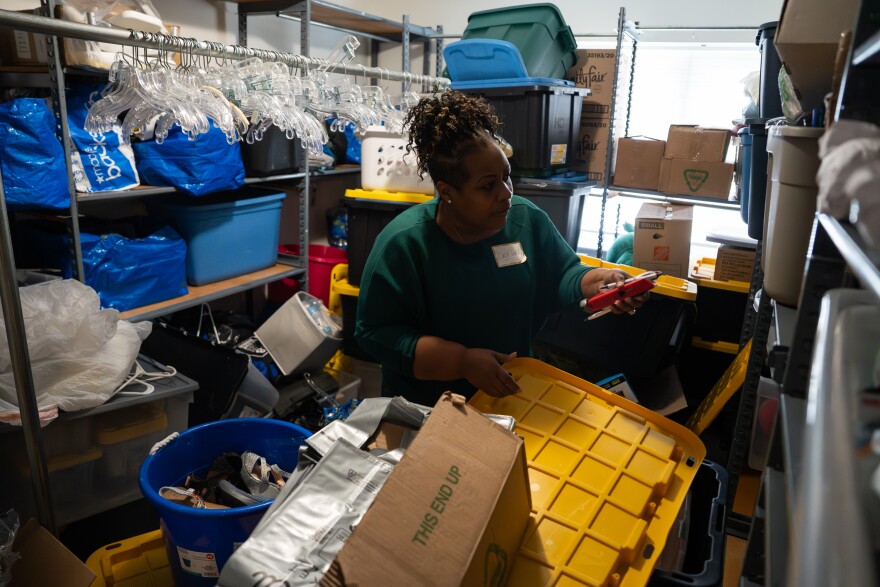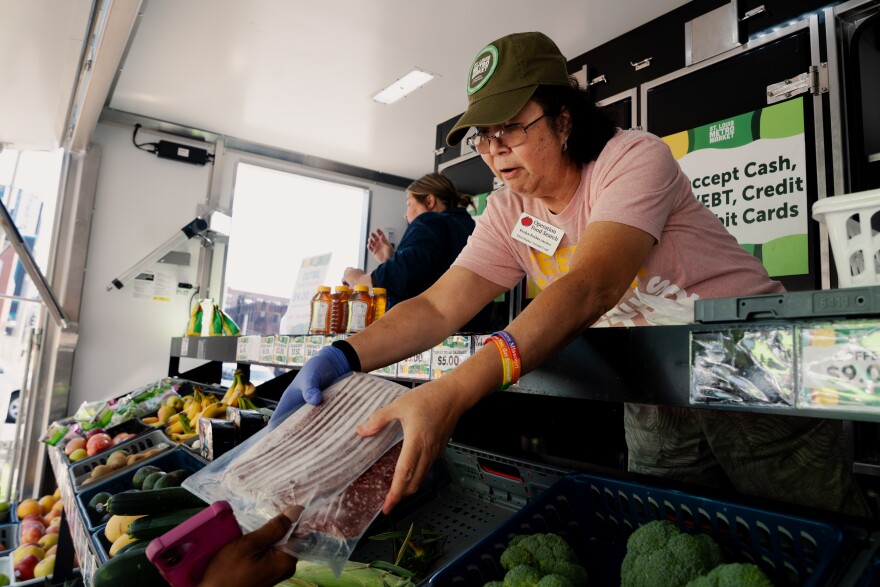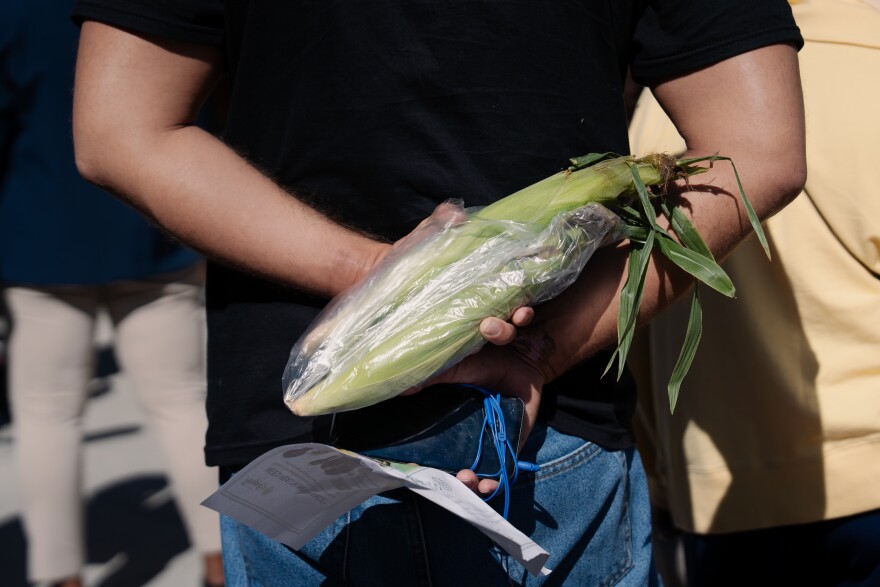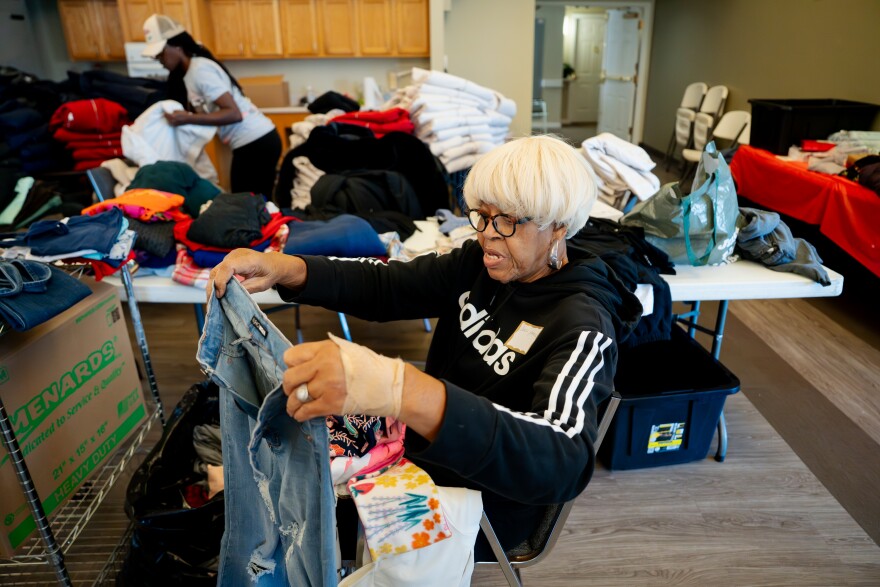During a store run at Dierbergs last month, Marty Casey, founder of the UnGUN Institute in St. Louis, says she spent nearly $300 on about 3½ meals.
She purchased milk, cereal, shrimp, raw steak, chips and a handful of other items. She said it was almost double the amount she would have spent several years ago.
“I almost cried putting my groceries away, not so much because I couldn't get the groceries, or my needs were not met,” Casey said. “I cried for those who I know I'm serving, and all I could think about is that if I didn't have an opportunity to build a free store to where they could come and get free groceries at least once a week, how are they making it?”
The UnGUN Institute, established in 2020, helps individual families and communities that have experienced traumatic events. The organization has been providing essential items and free groceries to the community since the day after the May 16 tornado, Casey said. The institute started out at the St. Louis Artworks building on Delmar Boulevard immediately after the storm, but it's now housed at the Friendly Village senior living facility on Wells Avenue in Hamilton Heights.

The institute provides what’s called a “free store” twice a week — on Tuesdays, it gives out essentials like clothes, shoes, deodorant, detergent and more. On Thursdays, a variety of free groceries, including sausage, chicken, cereal, vegetables and snacks are provided starting at noon.
Food prices have increased by at least 3.2% since August 2024, according to the U.S. Department of Agriculture. And the Consumer Price Index for all food recently increased by 0.4% between July and August.
For all of 2025, prices for eggs, beef and veal, sugar and sweets, and nonalcoholic beverages were predicted to grow faster than their 20-year historical average rate, the USDA reported in September. Egg prices in August were 10.9% higher than in August 2024.
And it doesn't appear that the situation will get much better anytime soon. In 2026, prices for all food are expected to increase by an additional 2.7%, according to the USDA.
Nurses, firefighters and police are starting to show up more at food pantries across the region, which speaks to a growing need for resources, according to officials from Operation Food Search. Chief Operating Officer Carlton Adams said many people are sandwiched between generations and have to provide for extended family as well as their own.
“You have kids that are in school or college, but then parents that are out of the workforce and (they) didn't have the benefit of financial benefits, like pensions, that generation after generation of Americans depended upon and no longer are a part of the landscape.”


Casey said under the current circumstances in the U.S., fulfilling the needs of those who are food insecure is meeting the moment. She commended Operation Food Search in St. Louis for providing a significant amount of food and essentials for the UnGUN Institute’s free store, as well as other community donors.
“This is not just tornado victims,” Casey said. “This is not just people who live in the city. This is not just Black or not just white. We have many different nationalities, age groups and needs of individuals.”
And she’s big on names — calling the free store a “store” instead of a pantry helps preserve people’s dignity, she said.
“I don’t want anybody to feel like they are receiving a handout,” she added. “All of my volunteers started out as receiving, and now they’re serving. And that’s what I love about it because it allows community to change positions.
“However you enter into this community share circle, there's no judgment. It's just love.”
The federal government has been shut down since early October, leaving thousands of federal workers in the region without pay and others furloughed. Due to the shutdown, the Supplemental Nutrition Assistance Program lapsed on Nov. 1 for hundreds of thousands of Missourians and nearly 2 million Illinoisans, numbers largely made up of disabled and elderly people, the working poor, veterans and children.
A bipartisan group of Senate Democrats and Republicans reached a deal late Sunday to reopen the government after voting on the first procedural step on the measure.
A federal judge in Rhode Island recently ordered the Trump administration to use a contingency fund that would cover only about 65% of the program's monthly cost, as reported by NPR. But this could take weeks or months to distribute, experts say. The same judge ordered the administration to restore full benefits last week, but the Trump administration is appealing that ruling.

Food insecurity
The USDA announced in September that it would no longer release its longstanding food insecurity report, which had been published annually for 30 years, in an effort to save money and stop what it called “fear mongering.” Nonprofits like Operation Food Search decried the move as a poor decision, noting that federal, state and local organizations across the country use the data to assess food insecurity needs.
The final report was slated to be released on Oct. 22, but as the government shutdown lingers, the USDA has not provided an update on its publication. A banner sprawled across the top of the department’s website read: “Due to the Radical Left Democrat shutdown, this government website will not be updated during the funding lapse.”
However, according to its own reports, food deserts have been increasing.
The most recent USDA report showed that in 2023, 13.5% of U.S. households were food insecure, the highest rate since 2014. Between 2021 and 2023, Missouri was not among the six states with the highest food insecurity — Arkansas, Texas, Louisiana, Mississippi, Oklahoma and Kentucky.
Meanwhile, in the St. Louis area, north St. Louis and north St. Louis County have some of the greatest food needs, according to Operation Food Search President Kristen Wild.
“It's pretty widespread, but (these) are the areas where we deploy our MetroMarket program due to a lot of food deserts where folks don't have access to a full-fledged brick and mortar grocery store, and may be relying on a local convenience store (like) Family Dollar (or) types of places where there's not a lot of fresh produce and meat, and items that are healthy.”


The St. Louis MetroMarket travels across St. Louis, offering the local community the opportunity to shop at significantly lower prices than retail grocers. During a market visit on Oct. 9, a single head of cauliflower was $1.50; a bunch of broccoli was $1.25; bell peppers ranged from 65 cents to 90 cents; cucumbers were 30 cents; and a bunch of greens was 50 cents, for example.
And it's not limited to Missouri. The mobile market recently expanded in September, making its first stop in Illinois through a new partnership with the Jackie Joyner-Kersee Food, Agriculture, Nutrition Innovation Center in East St. Louis.
During a MetroMarket stop in October outside the People's Health Center in the West End, Samica Sendelbach spent about $13 for three pounds of oxtails. The oxtails, which aren’t always offered at the mobile market, cost roughly $4 per pound.
At grocery stores, however, the price can run $20 or more for a similar weight.

Sendelbach is an executive assistant at the center and said she’s been working there for eight months. She pointed to a line of people waiting to receive $5 vouchers from the center to use at the MetroMarket. All they had to do was get their blood pressure checked, and they could receive another voucher for completing an income survey.
Rhonda Nelson is also with the People’s Health Center and works in their referral department. She said people are only allowed one voucher a week for getting their blood pressure checked, and only one is allowed for the survey.
She said People’s Health conducts surveys for their food drives to learn how much food to bring.
“You just fill it out and you can get you what you want,” Nelson said. “Health is wealth.”
Visit the Operation Food Search MetroMarket website for a current schedule and truck locations. For more information on the UnGUN Institute’s free store, contact the nonprofit at dr.mkcglobal@gmail.com.






